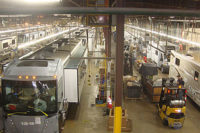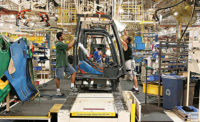Alabama is home to state-of-the-art auto plants operated by Daimler, Honda, Hyundai and Toyota. It’s also home to a state-of-the-art assembly line that builds toy cars out of Lego blocks: Tiger Motors. The operation is used to teach lean manufacturing principles at Auburn University.
The Lego Manufacturing Lab is the brainchild of Tom Devall, director of automotive initiatives in the Department of Industrial and Systems Engineering. The 4,000-square-foot facility was established in 2011 to emulate a high-volume auto plant.
“It allows us to use a hands-on approach to learning about best manufacturing practices,” says Devall, who formerly worked at Chrysler’s Sterling Heights, MI, assembly plant and at Continental Motors’ piston aircraft engine plant in Mobile, AL. “It is the only manufacturing lab of its kind in the country.
“The goal of experiential learning is to bring lectures to life,” adds Devall. “It allows us to build a product from start to finish, teaching how various systems interact.
“Legos are excellent for simulating real-world manufacturing processes,” claims Devall. “They allow us to use part quantities and cycle times similar to what’s found in the auto industry.
“Vehicles that require more than 250 pieces require enough work content to have a legitimate assembly process,” Devall points out. “You have inventory issues, overproduction runs, defects and quality problems. When working with tiny blocks at high speeds, it’s easy to misplace a part and not know it.”
Students build in 65-second cycles, producing two different types of vehicles: a 277-piece sportscar and a 254-piece SUV. The lab can accommodate up to 35 students at a time at 15 workstations, which were donated by a local electronics manufacturer that was discarding old production equipment.
Engineering students work in the lab several times during each semester of Devall’s lean manufacturing class. That allows them to witness the dramatic transformations that occur when implementing the Toyota Production System.
The first assembly line simulation at Tiger Motors focuses on traditional mass production and batch processing techniques. Afterwards, throughput and quality results are collected and analyzed by the students.
Midway through the semester, after discussing lean system design methods in a classroom setting, key principles, such as pull production, takt time and error proofing, are simulated in the Lego lab.
“Throughput and quality data are gathered again and compared to the prior mass-production run,” says Devall. “The results will typically show an improvement, but they won’t achieve our goals for takt time and quality.”
The last part of the lean manufacturing course focuses on kaizen and the important role people play in driving continuous improvement on the plant floor. Then, the last production run of the semester occurs, resulting in big improvements in throughput and quality.
Grad students serve a team leaders and work with undergrads to solve small problems (they also use the lab to conduct projects that focus on value-stream mapping and workcell design).
"There's a quality team leader, a throughput team leader and a supervisor," says Devall. "They make sure that all the necessary training is done and all the requirements are met."
Students must determine optimal inventory levels while using a material pull system based on demand. They also determine error-proofing strategies, as well as training and safety plans.
The lab features two U-shaped subassembly lines that feed a linear final assembly line. Work in process is manually transferred from workstation to workstation.
However, Devall eventually plans to incorporate automation that will link the workcells with conveyors, robots and vision systems. “We also want to put a moving conveyor on the straight line so that we can regulate speed to better simulate real auto plants,” he points out.
The Lego lab inspires new ways of thinking about manufacturing. “It encourages students to play in the sandbox and come up with ideas to improve the assembly process,” says Devall. “It inspires them to innovate, because they’re having fun.”
One recent idea involved putting RFID tags on parts bins used in Tiger Motors’ kanban system. “We spent $2,500 on RFID equipment and a four-person team successfully implemented a two-bin replenishment system,” notes Devall. “Students working in the supermarket area now instantaneously know when they have to start replenishing the assembly line.”
To learn more about the Lego Manufacturing Lab, click here to watch a video.




